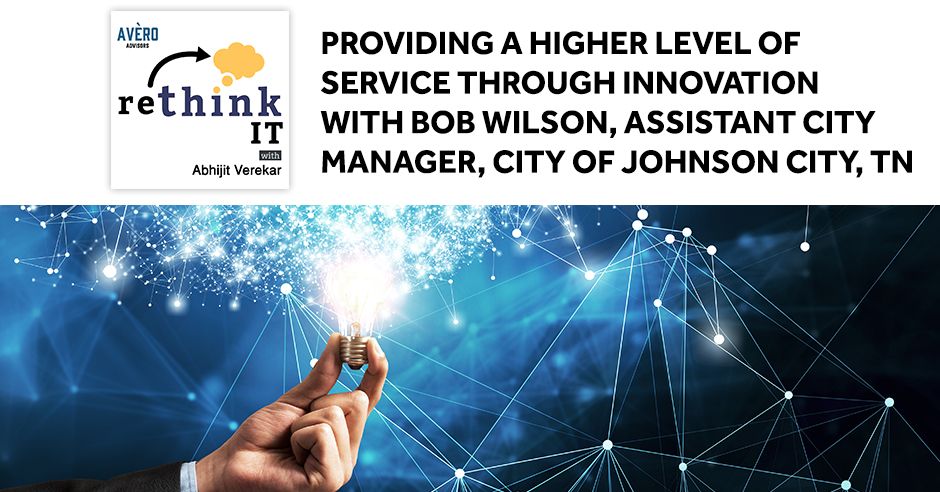Providing A Higher Level Of Service Through Innovation With Bob Wilson, Assistant City Manager, City of Johnson City, TN

More than helping you become more efficient and get a lot of work done, innovation is all about providing a higher level of service to others. In this episode, host Abhijit Verekar invites Bob Wilson, Assistant City Manager of the City of Johnson City, TN, to discuss how a smart city needs only to do that and not necessarily by having the latest and most advanced technologies. Here, they talk about how Bob is bringing forward innovation to the city, sharing how he deals with vendors when finding the software that fits their needs as well as translating his vision to his team and the citizens. He also talks about the ever-expanding role of IT officers and directors and being able to confront that as we move towards the technological future. Moreover, Bob taps into how he is adapting to the coming of the new generation in the workforce and how he keeps himself motivated after years in public service.
—
Listen to the podcast here:
Providing A Higher Level Of Service Through Innovation With Bob Wilson, Assistant City Manager, City of Johnson City, TN
My guest is Bob Wilson, who is the Assistant City Manager for the City of Johnson City. Bob has been in Municipal Management for a long time and is very experienced. He was the Deputy City Manager at the City of Bristol, Tennessee, and before that, with the town of Farragut. Bob, welcome to the show.
It’s good to be here, Abhijit.
Thank you for your time, Bob. Our audience would love to hear your story. How did you end up in the position that you’re in now?
It worked out that way in some ways. After I graduate school, I spent some time in South Carolina for about 7.5 years or so. Before Farragut, I worked for the City of Oak Ridge and got into budgets and from there, job openings came along. I was in Bristol for about 10.5 years and content to be there, it was a good job, I loved the people, and great place. I came to Johnson City, I knew the manager. It’s similar to what I did in Bristol, a little bigger city and different structure to some degree. It was a good fit. I could have easily stayed in Bristol, but I’ve been in Johnson City now several years.
The track you took was budgeting and finance.
Innovation allows you to get more work done and be more efficient with it. Share on XI have a Master’s Degree in City Management from the Master of Public Administration Program at ETSU. It used to be called Master’s of City Management. I did serve a year as a City Administrator in a small town in South Carolina. Somewhere I got off the manager and into the support staff role. The Budget aspect, when I got to Oak Ridge, it seemed to be a good fit. I’ve been on that side of the House and support staff. I enjoy what I do and luck the people I work with.
That’s key. You couldn’t last this long in a career without having that on your side. Bob, you’ve seen things change throughout the years. What are your thoughts on innovation and what that means to a city government or the everyday citizen?
There have been tremendous changes and it’s about efficiency. A lot of the more innovative things we do, we can provide better services. In this current situation, we’re doing a lot more things now remotely than we had planned on doing it. If this hadn’t occurred. We’re trying to minimize direct contact between our employees and the public, but still provide a high level of service. Innovation allows you to get more work done and be more efficient with it. As part of all that, hopefully, you’re providing a higher level of service like you’re getting more bang for the buck.
Isn’t it amazing that something like video conferencing has been around for many years and overnight we were all okay with it instead of doing in-person meetings? That’s fascinating. Bob, how do you stay current on new technology?
I rely on our IT director for a lot of things. You do it, trying to keep yourself informed, and reading, there’s a wealth of information out there that’s available. It’s hard. That’s a full-time job in and of itself. For my role, I depend on our IT director but I try to keep current by reading and when I have a chance to go to seminars or conferences. If our session is on IT, I usually attend those. There are many changes going on. As I say, it’s a full-time job keeping up. One of our big concerns is security. It may not be here at work and even at your home, your individual security, that issue becoming more and more to the forefront and it’s going to stay there. There are many people out there, some of the bad guys trying to get into your wallet that you have to be extremely careful.

Higher Level Of Service: Sometimes, the software might be great but not to the level where you need it. You have to prioritize what you’re looking at, what you’re buying, and what your needs are.
I like to say you’re up against an army of robots. All you can do is educate yourself and it’s commendable that you all have a solid IT staff you can lean on. Bob, I bet when you go to conferences and attend webinars, you get hit up by a lot of vendors selling the same stuff to you with a different sticker. Do you then rely on your IT to say, “Which one of these systems is best for us?” I’m sure they come to you and say, “Bob, we want to recommend the X system that we’re putting in.” What do you think of this? At your level, are you approving those purchases?
It’s like a partnership. You can go to conferences and a lot of people do. The vendors, everything they have is the latest and greatest. A lot of it is good software but you have to look at what works best for your city and for what your needs are. Sometimes it might be a great software, but you might not be to that level where you need that at first. You have to prioritize what you’re looking at, what you’re buying, and what your needs are. In a city like Johnson City where we have a number of departments, you have to prioritize those needs across the city and look at what software is going to provide the most improvements and resources to how many departments. You’re making a judgment call and looking at the big picture as to where you are and how it will best benefit the organization.
What you’re talking about is setting a vision and then driving that through. If a system fits that vision, you’re going to buy it within budgetary constraints. How do you translate that vision, Bob, from a business vision? What services do you want to offer to your citizens? How does that get translated to technical vision? My background is finance and accounting too. I’ve made a career out of translating business needs into technical needs. Who do you lean on when you say, “I want to provide such and such service in 10 to 15 years. IT, can you make that happen for us?” Do you have that partnership with your team?
We have a great partnership with our team. We have a solid, strong IT staff. I think you have to back up, and as part of the vision is to have some a plan and know where you want to go as an organization. Depending on what you’re looking at, some of the software can be quite expensive if you’re looking at financial software those types of systems. You have to look at your organizational needs as a whole and then prioritize what your needs are as to how you approach that and how fast you approach it. IT security gets a lot of attention. When our IT staff tells us, “This is something we need and it will help enhance our security,” I’ll look at it and say a strong look and give a lot of emphasis on that. We’re trying to protect our system. As I said, it’s a partnership. You work together.
You might have to tell one department, “We’re going to have to put you off for another year. Not that you’re not important, but when we look at everything, this is a higher-level need.” Our departments understand. It’s their job to ask and they understand that you don’t always get everything. You’d have to look at the monetary side, not just what the cost is. You’ve got to look at the time involved depending on what you’re doing. If we put in a new work order system a couple of years ago and that’s a lot of time involved in getting everybody, get all of the users online and getting into all the departments on. You’ve got to look at the time and the impact on staff with software too. You can only juggle so many balls at a time.
When purchasing software, you have to look at what works best for your city’s needs. Share on XWhat you’re saying is if you have a vision, have a plan, and make sure everyone gets it and it’s understood by everyone that you’re positioned on the plan may be further down, but there’s a reason for it. That’s excellent thinking, Bob. We hear the term, smart city, a lot. Everywhere we go, any magazine open, you’re talking about smart city. What is your definition of a smart city?
A smart city is a continuing target as technology continues to expand. That’s where it’s going to grow. You’re trying to provide as many resources as you can to your citizens electronically, digitally and to make the interaction with the city more efficient. Cities have always tried to use our tax dollars wisely and to maximize the benefit from that. A smart city is an enhancement of that. You can look at water meters that can raise itself, the digital meters and electronic reading. You can look at how you interact with your citizens. Our transit system, you can call up and you can see when the bus is coming or if it’s been delayed. How we interact with developers on submittal of plans. One thing that has happened with the way we changed is on our bids and proposals, we’re opening bids electronically now instead of having to come in, you don’t have to come in, but we can do it so people can observe it.
You’re getting the transparency which is saving time for people. There’s more, I’ve touched this as a highlight of it, but a lot of it is trying to offer more electronic digital services to your citizens and trying to spend your tax dollars wisely with that. That’s a balance in that you can only get on your staff and where you are. You can only go so far with that. Citizens are asking for more, putting more things online, sign up for recreational activities, reserving a shelter. That’s some simple stuff, but things like that, making payments online, our traffic at City Hall has been reduced because we don’t have as much walk-up traffic. We’re trying to encourage people to do bank drafts or to sign up and I’ll do a check draft from your account. Instead of coming inside, use our Dropbox. That’s another way of making those pipelines digital.
It’s interesting everything that you’ve mentioned, it’s been around for a long time. The perception of a smart city is like robots walking around you or scanning eyeballs and things like that. It’s simple. A smart city is a city that offers its citizens more value through digital services. I’m glad we’re thinking along the same lines there. Given those thoughts, what do you think is the evolving role of the CIO anymore? You don’t have people that are building systems for you, you have in your IT staff, I’m assuming, people who are more adept at looking at business processes and seeing what’s in the market and what applies to your operations. From an IT director’s perspective, how do you think their role is changing or will be changing going forward?
It will continue to expand. IT touches all departments. We are dependent on our computers and our up-heads as a way of doing business. I’ll say the role of the information officer, technology directors are expanding. It’s an integral part. We can’t work if our system goes down. If a computer goes down, we’re paying people to sit at their desk and twiddle their thumbs, so to speak. When do you afford to come back up? If there are the people on the outside trying to do business with us, it’s the same thing. It’s critical. On one side, you hate to be dependent on something but we’re there. It’s the world we live in. The IT directors, their role is more and more critical that they touch all departments like finance, billing, development services, police, fire, parks and recreation, everything. We’re all continuing to use technology more and more and that’s going to continue to grow in the future.

Higher Level Of Service: A smart city is a continuing target as technology continues to expand. You have to provide as many resources as you can to your citizens electronically and digitally to make the interaction with the city more efficient.
It’s almost become a utility. You walk into a room, you expect the lights to turn on, you expect the Wi-Fi to be there when you walk in, so I hear you. Let’s talk about the workforce a little bit. How are you seeing the new generation that’s coming into the workforce adopt older technologies? Cities and counties tend to be slightly behind by design in some cases compared to the private sector. You’re trying to bring in the best talent into your workforce. How do you reconcile that because they might have worked at the pilot or somewhere else where they have better systems? How do you keep up with recruiting where the younger generation is expecting a certain level of technology within your city?
They’re expecting certain things and it keeps us on our toes trying to keep up, but it’s a good challenge. That’s the way the world is going, that’s what they expect. They grew up with all this. Things I struggle with, it’s intuitive to the other people. It stretches us, but it makes us think which is good. It’s challenging for you to look at something differently or to take a different approach. Oftentimes, you can improve your process. You can rethink how you’re doing it. That’s good for your organization. I’m sure we frustrate some people sometimes because we’re not where they would like us to be, but our challenge is to try to get there as quickly as we can.
What keeps you motivated after all these years in public service?
That’s a good question. I enjoy what I’m doing. I’ve changed our retirement date several times, but it’s not a decision I struggled with. I’m one of those weird people, I liked my job and I feel fortunate that I enjoy that we have a good staff here. We have a good interaction with our employees. We have a great leadership team. We have a good city commission. I enjoy coming to work. If I got to the point that I didn’t like coming to work or I was dreading coming to work, I would have stopped a long time ago. I’ll feel like I’m making a contribution to the organization. With all the changes, it’s a challenge to keep up and it keeps you on your toes.
You have to bring your A-game to work and be receptive to sometimes doing things differently but that’s a good thing. It motivates me and this situation we’re in is totally unprecedented. I know that’s the word that’s been overused a lot lately, but it made us rethink some things that I don’t know that we would have thought about. There are a number of things that we’re doing differently now and because of this, we’ll keep doing them that way. As far as work, as long as you enjoy what you’re doing, you enjoy the people you’re working with, it makes it a lot easier to come to work that way. That’s why I’m still here.
We’re glad you’re still around in the industry. I heard you say that passion, looking forward to working, and constant learning is critical to having longevity in any work especially in public service. Thank you for that. You mentioned the city council. Every city and county we’ve talked to have struggled especially with COVID-19 to take the meetings online and do online voting. How did you do this? What technology did you use? How did you convince the council that this was the way to go?
As long as you enjoy what you're doing and you enjoy the people you're working with, coming to work becomes a lot easier. Share on XI don’t think convincing was hard. When the no-meeting came out, they were receptive to going online. I don’t know that I can answer some of the technical questions but everyone has their own camera, so they’re all on the big screen. When you go to our website, you can go on to the meeting. We have all the five commissioners, the city manager, our legal city attorney, and it works well. It’s a little different. You have to have to get used to that. They’re all mocked up and they can all talk. Once you go through one, it’s not that much different. It’s like a phone conference. We do leadership team phone conferences once a week and we have up to twenty people on the call. You wait your turn, try not to talk over people. I’m an old school, face-to-face but it’s an effective way of doing things. Any citizen can go online and pull it up.
I don’t know that we have a large number of people watching, but it’s user-friendly. You go to the website, click on the city commission, and there’s an icon there if you want to join the meeting. They’ve adapted to it well, so it’s working. The city manager’s handling all the meeting and filled in all the questions. A lot of times, in a regular meeting, we would have department heads there, other staff that would answer questions, and we haven’t had to get into that level of detail yet. If you did, you could still bring in more people. It might get a little more complicated, but it’s working. Personally, I’m looking forward to going back to the old school method. We’ll touch elbows or something if you want to get that close, but I would wave across the room. It’s working and it’s easy for citizens to do because it’s user friendly. The commission has adopted it and we’ll stick with this, at least through May. It’s a judgment call as to how things are going.
Bob, I don’t have any other questions, but this has been great. Thank you for joining us.
I appreciate the offer. It’s always good to talk to you. Thank you for the opportunity.
Thanks, Bob.
Important Links:
- Bob Wilson – LinkedIn
About Bob Wilson

U. S. Navy 1971 – 1975
Stationed in Hawaii (Barbors Point) for 2 years. 6 months in Okinawa, 3 months in
Philippines, and 3 months in Thailand
University of Tennessee, Business Admin. 1977
ETSU, Master of City Management 1981
Worked in several local government positions in South Carolina 1979 – 1986
City of Oak Ridge, Budget Officer & Assistant Finance Director 7 years
Town of Farragut, Assistant Town Administrator 2 ½ years
City of Bristol, Deputy City Manager 10 ½ years
Johnson City, Assistant City Manager since May 2007
Married – Sharon – two daughters, two grandchildren
Hobbies: reading, golf, hiking
Attend Cornerstone Church in J.C.
